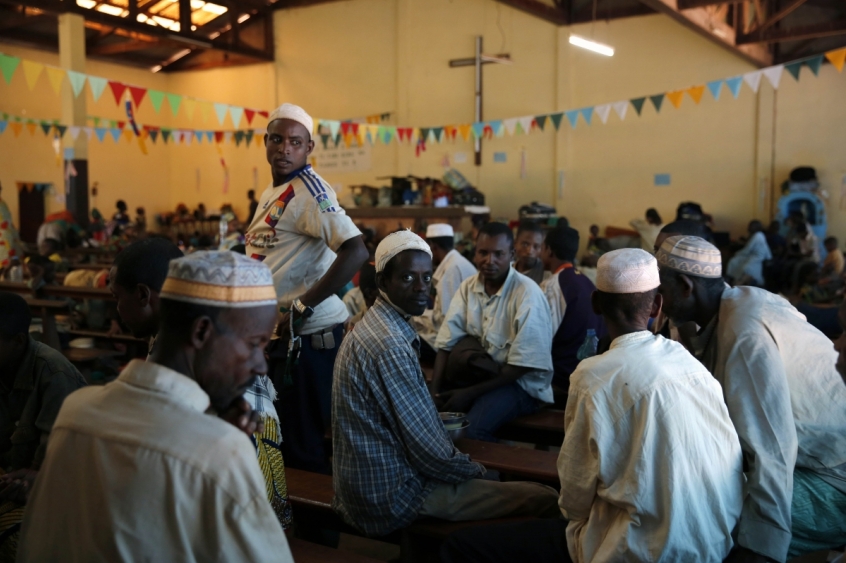
Two of the most senior religious leaders in the Central African Republic have issued a joint plea for a truce between retreating militant rebels and vigilantes who have been taking their revenge.
"May all the brothers carrying weapons hand over their arms," said the Catholic Archbishop of Bangui, Msgr Dieudonné Nzapalainga, during a February 21 joint appearance in Bangui, the capital, with Imam Oumar Kobine Layama, the president of the Islamic Community in CAR.
"Armed men have moved into places of worship, even into mosques," Imam Layama said.
"The military must disarm everyone, in churches and in mosques." Nzapalainga said. "Too many Central Africans carry weapons, Muslims and Christians. Arms take no sides."
The Central African Republic has been beset by violence since December 2012, when a coalition of militant Islamist rebel groups, led by Michel Djotodia under the Séléka banner, moved through the country to eventually drive out President Francois Bozizé in March 2013.
Djotodia disbanded Séléka in September, and as the rebels' influence waned, a wave of retaliatory violence from self-defence militias known as Anti-Balaka swamped the country. The United Nations expanded the French and African military presence in CAR to help restore order, and Djotodia was ousted in January in favour of Catherine Samba-Panza, the country's first female head of state. But the killing, looting, and destruction of villages have continued.
The Red Cross said 11 bodies, some of them mutilated, have been collected following clashes Feb. 25 and 26 in a predominantly Muslim area of Bangui. Since December, 1,240 corpses have been collected across the city.
About 20,000 refugees have arrived in Cameroon in the past three weeks, according to the UN High Commissioner for Refugees. In total, the ongoing violence has forced 288,000 to flee to neighbouring Cameroon, Chad, the Democratic Republic of Congo and the Republic of Congo.
Those who remain face deadly risk. More than 15,000 people in 18 locations in the northwest and southwest of the country are surrounded by armed groups, the UN agency warned.
"These populations are at very high risk of attack and urgently need better security," UNHCR spokesperson Adrian Edwards told reporters in Geneva on Feb. 25. "Although violence has hit all communities in CAR, most of the people who are trapped are Muslims under threat from anti-Balaka militiamen."
Meanwhile, atrocities ranging from rape, sexual assaults, looting, and killings have been committed by Séléka rebels as they retreat to the north, notably to neighbouring Chad and Sudan. Two nuns and their volunteer helper were sexually assaulted by members of Séléka, during an attack on a mission station near the border with Chad, according to Rev. Aurelio Gazzera, director of the Bouar Diocese chapter of Caritas, a Catholic relief agency, who spoke to Aid to the Church in Need, another Catholic organisation.
"One of the rebels who invaded the mission station held his gun to the head of one of the Sisters and tried to force her to undress," Gazzera said. "The other sister and the voluntary helper were also sexually molested."
He said on February 4 about 22 people, 14 of them women, were killed in their homes and several houses were burned in the village of Nzakoun, also near the border with Chad. The village's clinic was looted and destroyed by a hand-grenade.
Gen. Francisco Soriano, commander of French forces in CAR, has vowed to fight the Anti-Balaka, which he said are ''the main enemy of peace'' at the moment. Recent sweeps have rounded up several militia leaders and a large quantity of weapons. But restoring order to a country as large as France, Belgium, Denmark and Luxembourg combined is a tall order.
France has decided to add 400 soldiers to the 1,600 deployed since December in support of 4,500 African-led peacekeepers. UN General Secretary Ban Ki Moon has said at least 3,000 more soldiers and police are urgently needed. The European Union has pledged to dispatch between 500 and 1,000 troops, while France said Feb. 25 it will extend its military operation in the Central African Republic for four months.
As soldiers have tried to restore order, the country's clerics have beseeched the world to resist reducing CAR's violent turmoil to a religious conflict. "All anti-Balaka are not Christians and all Christians are not anti-Balaka. It is the same for ex-Séléka and Muslims," the Bishop's Conference of CAR said in a prepared statement issued in December.
Evangelical churches distanced themselves from armed groups in a statement issued February 5.
''A true child of God has received and must exercise the ministry of reconciliation as recommended by the New Testament," the statement released by the Alliance of Evangelical Churches said. "Therefore, AEC will take actions against those who for personal reasons and other ambitions contrary to the teachings of the Gospel of Peace of Jesus Christ, distort the essence of his existence and throw an infamous discredit on people of God, by identifying themselves as Anti-Balaka militia or Séléka rebels. Our battle is spiritual, not carnal and should be carried out on the knees and not weapons in hand.''
Alliance pastors across the country devoted February 26 to 28 to prayer, and public events are scheduled for March to encourage the faithful to repent.
On February 4, Catholic and Protestants leaders made their second joint statement opposing the violence.
"The confrontation between Séléka and Anti-Balaka has started a cycle of reprisals in which the civilian population has fallen victim. We condemn this violence, whatever its origin," read the joint statement, four prominent Church leaders, including Evangelical Alliance President Reverend Nicolas Guérékoyamé-Gbangou, and Archbishop Nzapalaigna.













